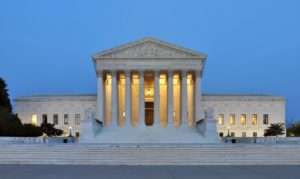The Volokh Conspiracy
Mostly law professors | Sometimes contrarian | Often libertarian | Always independent
My UnPopulist Article on Supreme Court Politicization and Dangers of Schemes to Undermine Judicial Review
While there is some genuine politicization, it is not as great as often claimed. Proposals to undermine judicial review could easily end up empowering the very sort of authoritarian president progressives fear.

The UnPopulist recently published my article on judicial politicization and the dangers of schemes to undermine judicial review. While some of my recent writings primarily annoy conservative Republicans, this one is likely to have the opposite valence. Here is an excerpt:
In recent years, it has become commonplace to claim that the U.S. Supreme Court is deeply politicized. The court's current 6-3 conservative majority is often seen as pursuing a partisan or ideological agenda, and views on the Court's rulings often break down along partisan and ideological lines. For some on the left, this perceived politicization justifies drastic measures like court-packing or executive defiance of judicial decisions.
In some ways, the judiciary is indeed politicized. But there are many occasions where conservative judges have prioritized jurisprudential values over any partisan or ideological goals, showing that the court is much more than a merely political body. Moreover, resorting to steps like court-packing in response to real or imagined judicial excesses risks destroying or gravely weakening judicial review—a cure far worse than the disease, one that would leave the country more vulnerable to aspiring authoritarians….
While accusations of judicial politicization are often overblown, the court's critics aren't completely wrong. In recent decades, political conflict over judicial appointments has increased, largely as a result of the increased polarization of U.S. politics….
There is, therefore, some basis for claims that the judiciary has become politicized. Indeed, it has never been completely free of politics.
But claims of politicization are also dangerously overstated. They overlook or minimize a wide range of important issues on which conservative judges have elevated legal and constitutional principles over partisanship and thereby curbed dangerous right-wing initiatives and abuses of power.
Such cases are not hard to find. Perhaps the most obvious and important example is that conservative judges serving on both lower courts and the Supreme Court rejected Trump's and other GOP efforts to overturn the result of the 2020 election….
Undermining judicial review through tools like court-packing is a standard tactic of incipient illiberal authoritarians like Hungary's Viktor Orban and Venezuela's Hugo Chavez as they seek to concentrate power in the executive; it's especially useful in the early stages of authoritarian consolidation. American progressives readily see this when it comes to countries like Russia, Turkey, Hungary and—most recently—Israel, where the right-wing government has been trying to eviscerate the power of that country's judiciary….
The point applies here at home, too. If you think Trump and other Republicans pose a grave danger to liberal democracy, you should be wary of dismantling one of the major institutions standing in their way. Imagine, for example, if Trump had been able to successfully resist judicial rulings against his efforts to overturn the 2020 election.
Even some controversial U.S. Supreme Court decisions opposed by the left bolster safeguards against authoritarianism. For example, the court's "major questions doctrine" requires Congress to "speak clearly when authorizing an [executive branch] agency to exercise powers of vast 'economic and political significance….'"
[I]f you fear concentration of power in a potentially authoritarian and illiberal executive, this doctrine is just the sort of approach you should support, since it prevents the president from using vaguely worded statutes to engage in massive power grabs. Even if you trust President Biden to wield such authority, you probably do not have similar faith in the next Republican president, who could well be Donald Trump, Ron DeSantis, or someone with a similar mindset….
The courts are far from perfect, and there is indeed a degree of politicization that impacts them. But conservative judges' willingness to rule against right-wing causes in a variety of important cases gives the lie to claims that Supreme Court justices are just politicians in robes. Even more importantly, destroying judicial review is likely to undermine liberal democratic values, rather than promote them, leaving us more vulnerable to authoritarian gambits in an era where authoritarianism is resurgent.
As noted in the article, I don't oppose all possible efforts to curb judicial prerogatives. For example, I think it would be good to impose term limits on Supreme Court justices, and that Congress may be justified in imposing new ethics restrictions on the justices, including limiting the gifts they are allowed to receive from private citizens. But proposals that threaten to destroy or severely weaken judicial review are a different matter.
UPDATED: In the initial version of this post, I accidentally neglected to include a link to my UnPopulist article. I apologize for the mistake, which has now been fixed.


Show Comments (96)